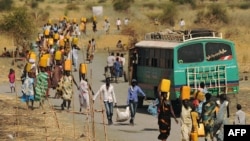GENEVA —
The U.N. refugee agency (UNHCR) is warning that tens of thousands of Sudanese refugees in neighboring South Sudan are facing a severe food shortage.
The agency is helping to care for 130,000 refugees from Sudan’s embattled Blue Nile State. They are living across the border in South Sudan, in camps in Maban County of Upper Nile state.
Maban County is not directly affected by the ongoing conflict in South Sudan. But UNHCR spokesman Adrian Edwards says insecurity and border restrictions along supply corridors have prevented the delivery of relief items since the beginning of the year.
He says in a VOA interview that it is urgent to get food into the refugee camps before the onset of the rains, which will render roads impassible.
“It has been impossible to get food pre-positioned there because of the insecurity we have seen. And this now is starting to show itself in some very worrisome consequences. Real shortages of food, growing rates of global and severe acute malnutrition. We are particularly worried about the impact this may have on people who, as they move - because if you move across from there toward Ethiopia, for example, the conditions are difficult, the route is difficult. It is likely that people arriving in Ethiopia, should they come there, will be in much worse state still," said Edwards.
Edwards says about one-third of the refugee population is at greatest risk. It includes children under five, pregnant and lactating women, elderly, the disabled and those who are chronically ill.
He notes the rains normally start in April, and warns that waterborne diseases, malaria and respiratory tract infections will increase.
“In recent weeks, we have seen several cases of kwashiorkor among very young children in the refugee camps… Kwashiorkor is a form of severe malnutrition to do with protein deficiencies… Food shortages could lead to conflict between refugees and host communities foraging for wild fruits and vegetables. Already, we have seen tension over grazing lands, over access to open water sources," he said.
The World Food Program has been providing normal food rations for the refugee camps. But, the agency says the crisis in South Sudan is making it extremely difficult to access this region and re-supply the camps.
Because normal supply routes are disrupted, WFP says it will be using a combination of airlifts and airdrops to replenish the stocks in Maban County.
An estimated 739,000 people in South Sudan have become internally displaced since fighting erupted in mid-December. The World Food Program so far has provided food to more than 420,000 conflict-affected people.
The agency is helping to care for 130,000 refugees from Sudan’s embattled Blue Nile State. They are living across the border in South Sudan, in camps in Maban County of Upper Nile state.
Maban County is not directly affected by the ongoing conflict in South Sudan. But UNHCR spokesman Adrian Edwards says insecurity and border restrictions along supply corridors have prevented the delivery of relief items since the beginning of the year.
He says in a VOA interview that it is urgent to get food into the refugee camps before the onset of the rains, which will render roads impassible.
“It has been impossible to get food pre-positioned there because of the insecurity we have seen. And this now is starting to show itself in some very worrisome consequences. Real shortages of food, growing rates of global and severe acute malnutrition. We are particularly worried about the impact this may have on people who, as they move - because if you move across from there toward Ethiopia, for example, the conditions are difficult, the route is difficult. It is likely that people arriving in Ethiopia, should they come there, will be in much worse state still," said Edwards.
Edwards says about one-third of the refugee population is at greatest risk. It includes children under five, pregnant and lactating women, elderly, the disabled and those who are chronically ill.
He notes the rains normally start in April, and warns that waterborne diseases, malaria and respiratory tract infections will increase.
“In recent weeks, we have seen several cases of kwashiorkor among very young children in the refugee camps… Kwashiorkor is a form of severe malnutrition to do with protein deficiencies… Food shortages could lead to conflict between refugees and host communities foraging for wild fruits and vegetables. Already, we have seen tension over grazing lands, over access to open water sources," he said.
The World Food Program has been providing normal food rations for the refugee camps. But, the agency says the crisis in South Sudan is making it extremely difficult to access this region and re-supply the camps.
Because normal supply routes are disrupted, WFP says it will be using a combination of airlifts and airdrops to replenish the stocks in Maban County.
An estimated 739,000 people in South Sudan have become internally displaced since fighting erupted in mid-December. The World Food Program so far has provided food to more than 420,000 conflict-affected people.




